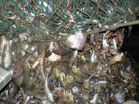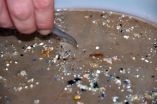(Press-News.org) ANN ARBOR--- Researchers at the University of Michigan, University of California Berkeley, and Arizona State University have developed a new data infrastructure for measuring economic activity.
The infrastructure uses aggregated and de-identified data on transactions and account balances from Check, a mobile payments app, to produce accurate and comprehensive measures of consumers' spending and income on a daily basis.
In a paper appearing in the July 11 issue of Science, economists Michael Gelman, Shachar Kariv, Matthew Shapiro, Dan Silverman, and Steven Tadelis report precise measures of how spending responds to the arrival of paychecks and government benefits.
They find that relative to other days of the month, spending jumps on the day that payments arrive and remains high for several subsequent days. [See figure at url above.] For most people this jump is not because they have difficulty managing their money. Instead it reflects the convenience of paying large, recurring bills right around paydays. The data reveal that non-recurring spending, especially at fast food restaurants and coffee shops, is quite smooth across days of the month.
The research, which was supported by the Alfred P. Sloan Foundation, aims to use data generated by households and businesses in the course of their normal activities to produce economic and demographic measurements that can augment existing measures that are currently generated from surveys. These innovative measurements hold the promise of improving the timeliness, frequency, accuracy, and scope of data available for understanding economic activity.
"The way government agencies and research organizations collect data must innovate to capture the huge amount of information generated by households and businesses as they go about daily economic activity," says Shapiro, a professor at the U-M Department of Economics and a research professor at the U-M Institute for Social Research (ISR).
"Traditional surveys are becoming increasingly costly to implement given the reluctance of individuals to respond. Naturally-occurring data, whether from accounts or social media, have the potential to reduce respondent burden, reduce the cost of data collection, and improve data quality while protecting the confidentiality of individuals. Survey reports of income, spending, and assets are typically subject to significant errors. Surveys should focus on data such as expectations, preferences, and attitudes that are inherently subjective rather than asking respondents to transcribe information that is readily available from electronic records."
"The data generated by online and mobile financial applications such as Check, as well as data from social media, online marketplaces, and ecommerce sites, can be analyzed to address questions that policymakers, firms, and individuals must answer to make better decisions," says Tadelis from UC Berkeley's Haas School of Business.
Questions that can be addressed with naturally-occurring data include:
How does individuals' spending respond to arrival of income?
Why do individuals get tax refunds? Do they use tax refunds to spend, save, or pay debt?
Are spending and income rising or falling? Is the economy at a turning point?
What is the response of the economy to shocks such as the 2013 government shutdown?
Having accurate economic measurement this precise and this timely should help policymakers, according to Shapiro.
In contrast with official data that often lag by weeks, months or longer, naturally-occurring data can be available almost immediately, he points out. Policymakers such as the Federal Reserve Board need to be prepared to make decisions in response to rapidly changing economic activity. The precision of the estimates provided by naturally-occurring data sheds new light on the response of individuals to economic stimulus. Gelman et al. find that much of the apparent excess sensitivity of spending to receiving payments is due to the timing of recurring spending. Therefore, the response of the economy to fiscal stimulus such as tax rebates is likely to be smaller than previous estimates imply.
INFORMATION:
Related work at the University of Michigan uses social media to construct economic indicators. As part of the NSF-Census Research Network (NCRN), based at ISR, the Michigan Economic Indicators from Social Media program uses Tweets to track job loss and predict new claims for unemployment insurance. The Twitter-based index captures the trends in official data, but with less statistical noise. For more information: http://econprediction.eecs.umich.edu/
For more information on the Science article, contact:
Matthew D. Shapiro, University of Michigan, (734) 764-5419, shapiro@umich.edu
Steven Tadelis, University of California Berkeley, (510) 220-0420, stadelis@berkeley.edu
Shachar Kariv, University of California Berkeley, (510) 250-2529, kariv@berkeley.edu
Daniel Silverman, Arizona State University, (480) 965-4832, daniel.silverman.1@asu.edu
Daniel Kjellen, Check, (925) 354-7955, daniel@check.me
Researchers harness a powerful new source of up-to-date information on economic activity
2014-07-10
ELSE PRESS RELEASES FROM THIS DATE:
International science team solve biological mystery
2014-07-10
This news release is available in German.
An international team of researchers, led by the University of Leicester, has solved a long-standing mystery in biology, by identifying the molecular structure of a vital biological chemical. The debate – which has raged within the scientific community for years – boils down to something as simple as a hydrogen atom: is it there, or is it not?
The controversy centres around a form of enzyme called a heme (or haem, as in haemoglobin) at the centre of which is an iron atom (Fe) called a 'ferryl' which becomes oxidised when ...
Overfishing in the English Channel leaves fisherman scraping the bottom of the barrel
2014-07-10
Decades of overfishing in the English Channel has resulted in the removal of many top predators from the sea and left fishermen 'scraping the barrel' for increasing amounts of shellfish to make up their catch.
Sharks, rays, cod, haddock and many other species at the head of the food chain are at historic lows with many removed from the area completely.
These are some of the findings of a study led by marine biologists at Plymouth University, in association with international non-profit research organization WorldFish. They analysed catches over the past 90 years and found ...
Uncertainty gives scientists new confidence in search for novel materials
2014-07-10
Scientists at Stanford University and the Department of Energy's SLAC National Accelerator Laboratory have found a way to estimate uncertainties in computer calculations that are widely used to speed the search for new materials for industry, electronics, energy, drug design and a host of other applications. The technique, reported in the July 11 issue of Science, should quickly be adopted in studies that produce some 30,000 scientific papers per year.
"Over the past 10 years our ability to calculate the properties of materials and chemicals, such as reactivity and mechanical ...
Scripps scientists discover evidence of super-fast deep earthquake
2014-07-10
As scientists learn more about earthquakes that rupture at fault zones near the planet's surface—and the mechanisms that trigger them—an even more intriguing earthquake mystery lies deeper in the planet.
Scientists at Scripps Institution of Oceanography at UC San Diego have discovered the first evidence that deep earthquakes, those breaking at more than 400 kilometers (250 miles) below Earth's surface, can rupture much faster than ordinary earthquakes. The finding gives seismologists new clues about the forces behind deep earthquakes as well as fast-breaking earthquakes ...
Leading scientists express rising concern about 'microplastics' in the ocean
2014-07-10
Microplastics – microscopic particles of plastic debris – are of increasing concern because of their widespread presence in the oceans and the potential physical and toxicological risks they pose to organisms.
This is the view of two of the world's most eminent authorities on the subject, Professor Kara Lavender Law, of Sea Education Association (Woods Hole, MA), and Professor Richard Thompson of Plymouth University (UK).
In an article published today in the journal Science, the two scientists have called for urgent action to "turn off the tap" and divert plastic waste ...
Control strategy for Dengue, malaria increases risk of West Nile virus
2014-07-10
Mosquitoes infected with the bacteria Wolbachia are more likely to become infected with West Nile virus and more likely to transmit the virus to humans, according to a team of researchers.
"Previous research has shown that Wolbachia -- a genus of bacteria that live inside mosquitoes -- render mosquitoes resistant to pathogen infection, thereby preventing the mosquitoes from infecting humans with the pathogens," said Jason Rasgon, associate professor of entomology, Penn State. "As a result, researchers are currently releasing Wolbachia-infected mosquitoes into the wild ...
New study shows drinking alcohol provides no heart health benefit
2014-07-10
PHILADELPHIA – Reducing the amount of alcoholic beverages consumed, even for light-to-moderate drinkers, may improve cardiovascular health, including a reduced risk of coronary heart disease, lower body mass index (BMI) and blood pressure, according to a new multi-center study published in The BMJ and co-led by the Perelman School of Medicine at the University of Pennsylvania. The latest findings call into question previous studies which suggest that consuming light-to-moderate amounts of alcohol (0.6-0.8 fluid ounces/day) may have a protective effect on cardiovascular ...
Study looks at how Twitter can be used to address specific health issues
2014-07-10
Childhood obesity is one of the top public health concerns in the United States, with 32 percent of youths aged 2-19 classified as obese as of 2012. As health problems such as childhood obesity grow, individuals and organizations have taken to Twitter to discuss the problem.
A new study, led by Jenine K. Harris, PhD, assistant professor at the Brown School at Washington University in St. Louis, examined the use of the hashtag #childhoodobesity in tweets to track Twitter conversations about the issue of overweight kids.
The study published this month in the American ...
Sophisticated radiation detector designed for broad public use
2014-07-10
CORVALLIS, Ore. – Nuclear engineers at Oregon State University have developed a small, portable and inexpensive radiation detection device that should help people all over the world better understand the radiation around them, its type and intensity, and whether or not it poses a health risk.
The device was developed in part due to public demand following the nuclear incident in Fukushima, Japan, in 2011, when many regional residents were unsure what level of radiation they were being exposed to and whether their homes, food, environment and drinking water were safe.
Devices ...
'Mississippi Baby' now has detectable HIV, researchers find
2014-07-10
The child known as the "Mississippi baby"—an infant seemingly cured of HIV that was reported as a case study of a prolonged remission of HIV infection in The New England Journal of Medicine last fall—now has detectable levels of HIV after more than two years of not taking antiretroviral therapy without evidence of virus, according to the pediatric HIV specialist and researchers involved in the case.
"Certainly, this is a disappointing turn of events for this young child, the medical staff involved in the child's care, and the HIV/AIDS research community," said NIAID ...




